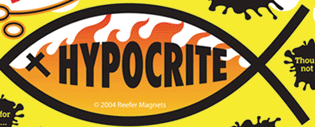Hypocrite, you are we

I have more than once met people who were shocked to find hypocrisy in Christian
leaders, mainly Bishops and Priests.
My answer was that if a Priest
stopped preaching about all the subjects he was himself darkened with or at
times failing at, he would not preach at all.
It is the same for
me, and I suspect all of us. If we waited until we were perfect to speak of
things of God, there would be only silence.
These are usually
referred to those “dark corners” or “closets” of ourselves.
Of
course, the Gospel says it better:
When the unclean spirit is gone
out of a man, he walketh through dry places, seeking rest, and findeth
none.
Then he saith, I will return into my house from whence I came
out; and when he is come, he findeth [it] empty, swept, and
garnished.
Then goeth he, and taketh with himself seven other
spirits more wicked than himself, and they enter in and dwell there: and the
last [state] of that man is worse than the first. Even so shall it be also unto
this wicked generation.
So as we all know.. this veil of tears is a
darn tough place to make our home.
Father Neuhaus as usual, says things nicely:
Link
As Miller points out, the case of Ted Haggard is very different. An oddity in much commentary on Haggard is the insistence that he denied who he really is. This is the mortal sin of being “in the closet.”
The pertinent text countering that way of thinking is Romans 7:13–20:
Did that which is good then bring death to me? By no means! It was sin, working death in me through what is good, in order that sin might be shown to be sin, and through the commandment become sinful beyond measure. We know that the law is spiritual; but I am carnal, sold under sin. I do not understand my own actions. For I do not do what I want, but I do the very thing I hate. Now if I do what I do not want, I agree that the law is good. So then it is no longer I that do it, but sin which dwells within me. For I know that nothing good dwells within me, that is, in my flesh. I can will what is right, but I cannot do it. For I do not do the good I want, but the evil that I do not want is what I do. Now, if I do what I do not want, it is no longer I that do it, but sin which dwells within me.
Note that carnal and flesh as used by St. Paul do not refer only, or even chiefly, to sexual sins. The carnal and fleshly is all that is opposed to the Spirit of God.
In tones of adolescent rage and petulance, which is the characteristic gay voice, commentator after commentator has accused Haggard of hypocrisy, insisting that what he claims to see as his sin is, in fact, his true self, and demanding that he embrace his sin as his authentic identity. At the core of such commentary is an adamantly binary view of sexuality—one is either straight or gay, all the way. This completely ignores findings otherwise celebrated by proponents of sexual liberation, such as Kinsey’s scale of 1 to 5 in heterosexual/ homosexual orientation. Much more important, it is a naive indifference to the reality of the conflicted self, which is the subject of all great spiritual and psychological writing, as well as the best of the novels and dramas of our civilization. Gay propagandists have room neither for St. Paul nor Hamlet.
What most Americans know about being gay is distinctively unattractive and, in their view, morally repugnant. Gay advocates deceive themselves in thinking that the more people know about homosexuality the more they will approve of it. Moreover, it is self-evident to such advocates that gay trumps straight. If a Ted Haggard is by every indicator a good husband and father of his children, and also a preacher who teaches that homosexuality is morally disordered, but occasionally falls into sin and consorts with a male homosexual, it is obvious to such advocates that he is not a good husband and father but is gay. And a hypocrite to boot.
This is a self-serving illogicality that is not likely to convince anyone not captive to the gay ideology. I expect most people will continue to hold with the maxim to hate the sin and love the sinner. To the gay insistence that they love the sin and hate only those who call it sin, they will respond with St. Paul’s much more profound—dare I say nuanced?—understanding of the conflicted self.




0 Comments:
Post a Comment
<< Home